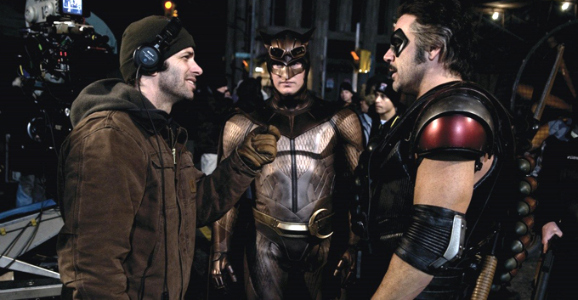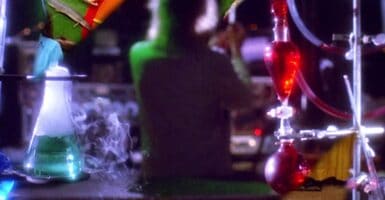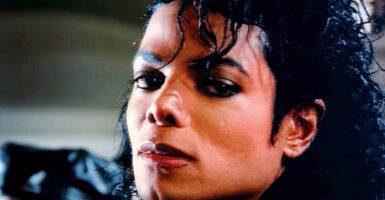Zack Snyder Calls Terry Gilliam’s Watchmen Ending Completely Insane
This article is more than 2 years old
 Alan Moore and Dave Gibbons’ Watchmen is one of the most seminal works in comics history. The film adaptation lingered in development hell for years beginning in 1986, up until Warner Bros. acquired the film rights in 2005 and hired Zack Snyder to direct. As much as his changes to the story may have irritated die-hard fans of the comics, the Watchmen movie could have gone a very different direction if Terry Gilliam and Joel Silver’s version had made it to the screen.
Alan Moore and Dave Gibbons’ Watchmen is one of the most seminal works in comics history. The film adaptation lingered in development hell for years beginning in 1986, up until Warner Bros. acquired the film rights in 2005 and hired Zack Snyder to direct. As much as his changes to the story may have irritated die-hard fans of the comics, the Watchmen movie could have gone a very different direction if Terry Gilliam and Joel Silver’s version had made it to the screen.
While Snyder’s ending changed some of the specifics of how the story ended, it was still operating around the same basic idea: uniting humanity through fear of a threat that endangered our entire species. The Gilliam version, on the other hand, would have involved time travel and, frankly, would have been an enormous cop-out that would undoubtedly have pissed off Watchmen fans even more than the ending we got. The final act of Gilliam’s version would have seen Dr. Manhattan traveling back in time to stop the very experiment that created him, thus effectively negating the entire story we’d seen play out. In a new interview with the Huffington Post, Snyder and his producing partner and wife Deborah Snyder spoke about Gilliam’s version of Watchmen, as compared to their take:
‘…if you read the Gilliam ending, it’s completely insane,’ [Snyder] said. ‘Yeah, the fans would have stormed the castle on that one. So, honestly, I made Watchmen for myself. It’s probably my favorite movie that I’ve made. And I love the graphic novel and I really love everything about the movie. I love the style. I just love the movie and it was a labor of love. And I made it because I knew that the studio would have made the movie anyway and they would have made it crazy. So, finally I made it to save it from the Terry Gilliams of this world.’
The 48-year-old director also talked about the end of Watchmen when compared to Terry Gilliam’s version. His ending captured the spirit of the graphic novel, if not the details. It was going to be challenging to sell Watchmen‘s whole “giant space squid” ending, but Snyder says he still wanted to stick as close to the spirit of the comic as possible. Snyder continues:
‘…I guess that’s what I’m getting at with the end of Watchmen — in the end, the most important thing with the end was that it tells the story of the graphic novel. The morality tale of the graphic novel is still told exactly as it was told in the graphic novel — I used slightly different devices. The Gilliam version, if you look at it, it has nothing to do with the idea that is the end of the graphic novel. And that’s the thing that I would go, “Well, then don’t do it.” It doesn’t make any sense.’
It’s hard to please everyone when you’re adapting something as beloved as the original Watchmen graphic novel. “But it’s interesting because… it’s damned if you do, damned if you don’t,” says Deborah Snyder. “You have people who are mad that the ending was changed and you have other people saying, ‘Oh, it was a slave to the graphic novel.’ You can’t please everybody.”
Snyder went on to explain that his film was ultimately a satire of comic book and superhero movies of the last decade, and that if Watchmen were released today, its satirical tone would be evident when compared to movies like The Avengers. So I guess in some ways, Watchmen was just ahead of its time. Snyder says:
You know, the whole movie is a satire. It’s a genre-busting movie. The graphic novel was written to analyze the graphic novel — and comic books and the Cold War and politics and the place that comic books play in the mythology of pop culture.
The Watchmen movie was a satire? I’m not sure about that. There was practically nothing humorous about the film’s tone. The Nite Owl and Silk Spectre sex scene was pretty funny, but I think that was unintentional humor.
I was not a big fan of the Watchmen movie. The height of the film was its opening title sequence and after that it was all downhill. While I do think Terry Gilliam is a better director than Zack Snyder, I have to agree that the movie we ended up getting sounds a lot better than Gilliam’s version.












